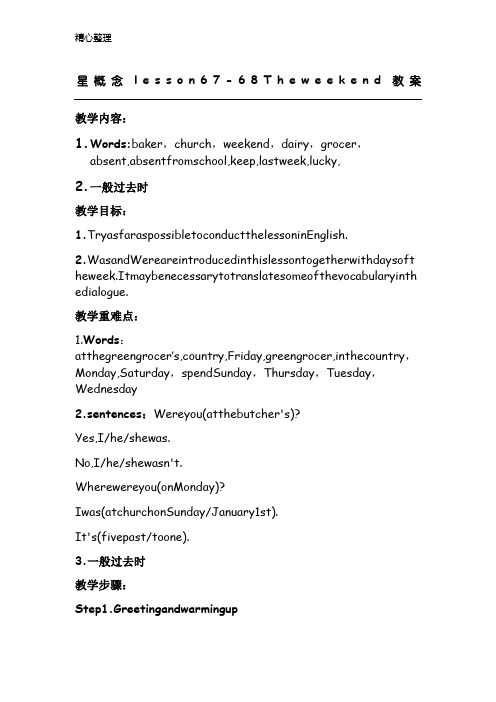新概念一第67课教案
新概念第一册67课ppt课件

New words
• absent adj. 缺席的; • be absent from work 旷工 • be absent from school 旷课
采用PP管及配件:根据给水设计图配 置好PP管及配 件,用 管件在 管材垂 直角切 断管材 ,边剪 边旋转 ,以保 证切口 面的圆 度,保 持熔接 部位干 净无污 物
• 修改后:
• We are going to spend three days in the country.
采用PP管及配件:根据给水设计图配 置好PP管及配 件,用 管件在 管材垂 直角切 断管材 ,边剪 边旋转 ,以保 证切口 面的圆 度,保 持熔接 部位干 净无污 物
7
• We are going to say at my mother for the weekday.
1
• Was you at the butcher? • Yes, I were.
采用PP管及配件:根据给水设计图配 置好PP管及配 件,用 管件在 管材垂 直角切 断管材 ,边剪 边旋转 ,以保 证切口 面的圆 度,保 持熔接 部位干 净无污 物
1
• Was you at the butcher? • Yes, I were.
• 修改后: • Were you at the butcher's? • Yes, I was.
采用PP管及配件:根据给水设计图配 置好PP管及配 件,用 管件在 管材垂 直角切 断管材 ,边剪 边旋转 ,以保 证切口 面的圆 度,保 持熔接 部位干 净无污 物
2
• Was you on the butcher's, too? • No, he weren't.
新概念英语第一册第67课

目录 Contents
• Overview of Text Content • Vocabulary and expression • grammar point • text analysis • Practice and activities
。例如:“I like apples,
but
my
friend
doesn’t.”
复合句
包含一个主句和一个或多 个从句的句子。例如:“I like apples, which are healthy for me.”
Tenses and Voices
时态
描述动作发生的时间,如现在、 过去或未来。例如:现在进行时 “I am eating an apple.”
语态
描述动作与主语的关系,如主动 或被动。例如:被动语态“The apple is being eaten by me.”
Grammar application
名词
用来表示人、事物或抽象 概念的词。例如: “apple”、“person” 、“happiness”。
动词
描述动作或状态的词。例 如:“run”、“eat”、 “be”。
VS
Activity 2
Have a small group discussion about a topic related to the lesson. Each person should contribute their ideas and listen to others, practicing active listening and turn-taking.
新概念第一册67-68课课件

新概念第一册6768课课件大纲
汇报人:
目 录 CTLOG
01
单击此处 添加目录标题
04
课程内容讲解
02
课件概览
03
课程重点与难点
05
课程练习与巩固
06
课程总结与回顾Байду номын сангаас
01
添加章节标题
02
课件概览
课件封面 标题:新概念第 一册67-68课课件 大纲
作者:XXX
副标题:课件 概览
逐句进行中英文 对照翻译
强调常用词汇与 表达方式
结合例句说明语 言点
课文段落解析与总结
段落大意概括: 每段课文的内
容简述
重点词汇解释: 课文中出现的 生词和难词的
详细解释
语法结构分析: 对课文中的复 杂句型和语法
的讲解
课文主题思想: 对课文整体内 容的理解和总
结
05
课程练习与巩固
词汇练习
词汇练习的形式包括单词拼 写、词义匹配、选词填空等。
课文重点词汇与短语讲解
重点词汇:掌握课文中的重点词汇包括发音、拼写和用法。 短语讲解:深入理解课文中的常用短语包括意思、用法和例句。 词汇拓展:根据课文内容拓展相关词汇和短语帮助学生扩大词汇量。
练习巩固:设计相关练习题帮助学生巩固所学词汇和短语提高记忆和应用能力。
课文句子解析与翻译
解析重点句子结 构与含义
能够正确地使用这些词汇和短语进行口头和书面表达并能够理解含有这些词汇和短语的句子和段落。
通过练习和活动加深对这些重点词汇和短语的记忆和理解提高语言应用能力。
难点解析与练习
难点解析:讲解课文中的复杂语法点和难点词汇 帮助学生更好地理解课文。
新概念英语67课讲义资料讲解

新概念英语67课讲义Lesson 67 the weekend 周末一、单词与短语greengrocer: n.蔬菜水果零售商;absent:adj.缺席的,重要短语:be absent from:缺席、、、、He was absent from school last week.上周他没上学。
keep: v.(身体健康)处于(状况),保持、、、keep doing sth:一直做、、、或者是不停地做、、、、;keep knocking the door:一直敲门;spend:v.度过;spend a weekend:度周末;weekend:v.周末;country:n.国家;乡村;lucky: adj.幸运的;luck:n.幸运,机遇。
Monday:n,星期一;Tuesday:n.星期二;Wednesday:n.星期三;Thursday:n.星期四;Friday: n.星期五;Saturday: n.星期六;Sunday: n.星期日;在星期几前边一般加介词on,如:on Monday:在周一;On Sunday:在周日;二、短语、句型与语法1、Were you at the butcher′s?刚才您在肉店里吗?Yes, I was. 是的,我在。
在本句中,需要注意的一个知识点:在英文表示某一种商店的短语中,shop这个词往往可以省略,如文中的the butcher′s 其实就是the butcher′s shop的省略,另外像文中的the greengrocer′s 其实就是 the greengrocer′s shop 的省略,另外的例子还有the hairdresse r′s (shop )等等,shop 的省略不影响句义,就是一种表达的习惯。
2、how is jimmy today?吉米今天怎么样?在本句中我们继续复习关于询问人或事物状况的几个重要的句型:How is/are+主语、、、怎么样?例:How are you today?你今天可好?How is Tom today?汤姆今天可好?另外What is the matter with、、、?经常用来询问人和事物的状况,常作“是否有问题”“是否有麻烦讲”例如:What is the matter with Tom?汤姆怎么了啊?What is the matter with this bike?这辆自行车怎么了啊?What is the matter with the book?这本书怎么了?3、Was he absent from school last week?上周他没上学吧?在本句中需要掌握一个重点短语的用法:be absent from:缺席、、、例:He is absent from the meeting since he is ill.他今天缺席会议是因为他病了。
新概念第一册67课课件

(完整word版)NCE. Lesson67.教案文档

新概念英语第一册67课教案Grammar 语法一般过去时(simple past tense) :过去发生的而现在已经结束的动作要用一般过去时。
基本用法:1、常用来表示过去某一时间所发生的非持续性动作;e.g. He played computer games last week。
他上周玩了电脑游戏。
We went to school yesterday. 我们昨天去了学校.They saw a film together last night. 他们昨晚一起看了电影。
2、表示在过去的一段时间内经常或反复发生的动作或存在的状态. 表示过去习惯性, 经常性的动作、行为;过去主语所具备的能力和性格。
e.g。
Mrs. Peter always carried an umbrella. 彼得太太过去老是带着一把伞.I was late yesterday. 昨天我迟到了。
When she was a teacher, she was very strict。
当她以前是一名老师时,她很严厉.3.一般过去时表示过去某一特定(与现在无关)的时间,与具体的表示过去的时间状语连用。
Eg:: last year (去年), two days ago(2天前), yesterday(昨天) ,just now(刚才), this morning(今天早上), last night(昨晚),the day before yesterday(前天)等。
一般过去时的句型构成形式:一、含有系动词(be动词——am/is/are)的一般过去时形式:✿be动词的现在时和过去时的对比:总结:✿ was(is/am的过去式)用于第一人称单数(I)和第三人称单数(he/she/it)及所有单数形式;✿ were(are的过去式)用于所有其它的人称和所有复数后即:第一人称复数(we)、第二人称单复数(you)、第三人称复数(they)等。
新概念英语第一册L67-68教案

星概念l e s s o n67-68T h e w e e k e n d教案教学内容:1.W ords:baker,church,weekend,dairy,grocer,absent,absentfromschool,keep,lastweek,lucky,2.一般过去时It's(fivepast/toone).3.一般过去时教学步骤:Step1.GreetingandwarmingupStep2Review检查课文背诵相关作业的口头提问Step3Newwords1.spendv.(1)花(时间等);度过:spend+n./pron我们要在我妈妈家呆几天。
1.IntroducethestoryT:Todaywe’lllistentoastoryaboutMrsWilliamsandMrs.Johnson.2.UnderstandthesituationAskthestudentstointerpretthepictures3.Askandanswerthequestions(Lookatthepictures):a.T:WasMrs.Johnsonatthebutcher’s?S:No,shewasn’t.b.T:Wassheatthegreengrocer’s?S:Yes,shewas.c.T:Whowasatthebutcher’s?S:Mrs.Williamswas.d.T:Whowasatthegreengrocer’s?S:Mrs.Johnsonwas.b.atthebutcher's=atthebutcher'sshop。
在英文中,表示店铺、住宅、公共机构、公共建筑物以及教堂的名字或某人家时,名词所有格后常不出现它所修饰的名词:thegreengrocer's(shop)蔬菜水果店thehairdresser's(shop)理发店thestationer's(shop)文具店thedoctor's(office)诊所mymother's(house)我妈妈家里St.Paul's(Church)圣保罗教堂c.beabsentfrom…不在,缺席beabsentfromschool/work他情况用were。
新概念1 第67课教案

Teaching planLesson 67 The weekendTeaching aims:Master the new words and textMaster the simple past tense, the usage of was and wereTeaching importance and difficulties:The new words and some expressions in the textThe simple past tense and the verb past formTeaching steps:Step1 : RevisionReview the words and have a dictation ; review the text and recite itStep2 : new lessonA: lead inT: what did you do last weekend? What are you going to do this weekend? Ss: …B: New words:Greengrocer absent keep spend lucky church dairy bakerGrocer Monday Tuesday Wednesday Thursday Friday Saturday Sunday C: textListen and answer question: what are the Johnsons going to do at the weekend?1. is, am --- was are --- were一般过去时:表示过去发生的而现在已经结束的动作Was 用于第一人称单数were用于其他人称Eg: Were you at school yesterday? Yes, I was. No, I wasn’t.Was she/he a driver before? Yes, she/he was. No, she/he wasn’t.Were they at home last night? Yes, they were. No, they weren’t.2. absent adj. 缺席的,不在的反义词:present adj. 在场的Be absent from 因故缺席You should not be absent from school.Are all the students present?3. How are you all keeping? (问候对方的话) 你们身体都好吧?=Is everything ok? /How is everything going?4. spend v. 度过;花费How did you spend the weekend last week?Sb. spend money/ time on sth/ (in) doing sth. 某人花费时间/金钱在某事上/在做某事情上Eg: I spent 100 yuan on this new bike.I am going to spend an hour (in) doing my homework.当spend 作花费讲时,可以相当于takeIt takes sb. sometime to do sth. 花费某人时间做某事Eg: It took me half an hour to get to school this morning.5. my mother’s 我妈妈的家sb’s 指的是某人的住所/商店The greengrocer’s 水果销售商的商店6. Aren’t you lucky! 你不是很幸运!否定疑问句形式的感叹句,做强调语气的作用Lucky 幸运的unlucky不幸运的luck 运气You are so lucky. You are a lucky dog. Good luck for you.D: read and recite the textStep3: Do some exerciseStep4 : Sum up and homework。
- 1、下载文档前请自行甄别文档内容的完整性,平台不提供额外的编辑、内容补充、找答案等附加服务。
- 2、"仅部分预览"的文档,不可在线预览部分如存在完整性等问题,可反馈申请退款(可完整预览的文档不适用该条件!)。
- 3、如文档侵犯您的权益,请联系客服反馈,我们会尽快为您处理(人工客服工作时间:9:00-18:30)。
Lesson67
编写人:王海洋
导入
He was a baby 17 years ago. He is a singer now.
She was a lovely girl many years ago. She is a beautiful girl now.
He was a boy lots of years ago. He is a basketball player now.
语法1—一般过去时的讲解(主系表结构)
With the time flies, you changed, I changed and also there is a word changed: be. 在现在时中是am, is, are。
在过去时中它们变成了was, were.
引导学生把上面的六个句子分别变成疑问句,变否定句。
并且告诉学生was not= wasn’t; were not= weren’t
操练1:
✧I am at the grocer’s.
✧They are at the dairy’s.
✧Penny is at the baker’s.
✧Tom is at the hairdresser’s.
变成过去时,再变否定,变疑问
✧Jerry is at his mother’s
✧She is in hospital.
✧He is at church.
✧You are at school.
✧I am at the butcher’s.
✧Tom isn’t in the room.
✧They aren’t careful.
✧Are you in London?
✧We are hungry, too.
✧Is your mum a doctor?
✧There are two monkeys in the tree.
操练2:
They_____ in the country last week.
_____ you tired just now?
He _____ in London yesterday, but today he _____ in Beijing.
我那时五岁。
我们今天早晨八点钟在家。
We were at home at 8 o’clock this morning. 昨天我们在学校。
昨天早上我妈妈在办公室。
昨天傍晚我朋友在理发店。
昨天天气如何?
带领学生完成本课的随堂练习
时态总结:
✧现在进行时:表示现在正在发生的事情
✧一般将来时:表示将要发生的事情
✧一般现在时:表示通常的状态和经常发生的事情
✧一般过去时:表示过去发生的事情
语法2—名词表地点
Eg:
✧at the butcher’s ✧at the baker’s ✧at the greengrocer’s
✧at the stationer’s
✧at the doctor’s
✧at the hairdresser’s
At my mother’s
At my uncle’s
总结:有the表具体,无the表抽象。
操练1:
让学生快速说出这些地点
✧肉店,蔬菜水果店,面包店,诊所,乳品店,教学操练2:
给出人物,店,表示过去的时间,让学生快速造句Eg: Tony was at the butcher’s on Monday.
Mary was at her mother’s last Sunday.
语法3—介词in, on, at表时间
操练1:
✧_____ 1995
✧_____August ✧_____ May, 4TH ✧_____ Monday ✧_____ spring
✧_____ 5:30
✧_____ Sunday
✧_____ Friday afternoon
✧_____ London
✧_____ Italy
✧_____ the country
✧On May, 5th
操练2:
要求学生根据双课图片造句,之后对这些句子进行划线部分提问
课文
用Where, how, what, when这四个特殊疑问词来串课文。
课文中的知识点:
✧be absent from:
✧be late for:
✧spend: sb. Spend 时间/金钱on sth/ in doing sth
✧Aren’t you lucky! Aren’t you tall! Isn’t he clever!Don’t you want a new car!Can’t he swim!
在一般疑问句的第一个单词后加上Not,并且缩写,即为否定疑问句,用以表达肯定的意思,表示强调。
要求学生掌握的特殊动词的过去式
Lose, understand, stand, buy, have/has, know, wear, make, tell, sell, grow, catch, teach, keep, sweep, come。
